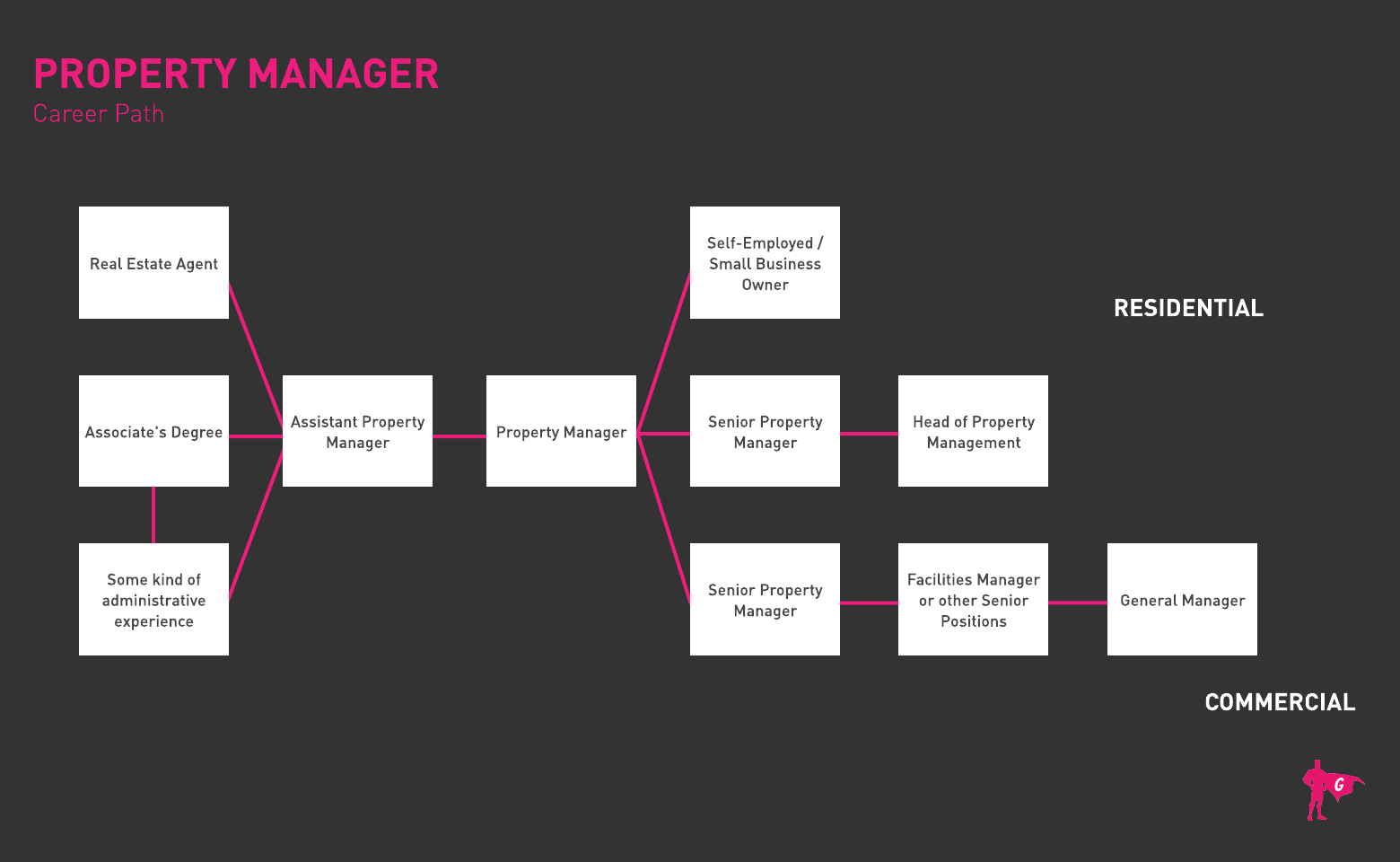스포트라이트
Apartment Manager, Community Association Manager, Community Manager, Lease Administration Supervisor, Leasing Manager, Occupancy Director, On-Site Manager, Property Manager, Real Estate Manager, Resident Manager
Two things all buildings have in common? 1) Someone owns them, and 2) they’re probably expensive!
Real estate prices have been on a rollercoaster lately, with home prices and interest rates pushing a lot of people to rent a house or apartment instead of buying. Meanwhile, more small businesses are leasing commercial spaces versus risking a purchase because there’s no guarantee they’ll be able to stay in business.
Owners of residential and commercial properties rent or lease to tenants who pay them each month in exchange for using the buildings or spaces. These owners, of course, must ensure their properties are well-maintained while they’re being rented out. Owners also have an obligation to their tenants to keep things in order and respond to problems—which is where Property Managers some in!
Property Managers protect the owner’s investment, making sure the building or space is kept up so it retains its value. They may advertise to potential tenants directly or use a third-party agent. They handle the financial aspects of managing the property, collecting rent, paying mortgages (if the owner still owes money to a lender), and helping to deal with insurance and taxes. Property Managers also send out crews to take care of routine maintenance issues or to address problems, as needed.
- Helping people find housing or commercial space to rent
- Taking care of property owners and tenants
- Contributing to the overall real estate economy
근무 일정
Property Managers work full-time and may need to respond to urgent after-hours tenant issues. Traveling to view and inspect properties is necessary if the manager doesn’t live on the premises.
일반적인 업무
- Meet property owners to discuss goals (and timelines, if they only want to rent a building or space for a temporary period)
- Advertise available properties or work through an agent
- Interview potential tenants and provide tours of available properties
- Review rent or lease terms, responsibilities, and costs
- Collect rent and other applicable fees
- Make mortgage payments to lenders
- Submit taxes and insurance premium payments on time
- Hire contractors to perform tasks related to painting, roofing, windows, flooring, gutter cleaning, tree trimming, landscape work, plumbing, and HVAC-R
- Collaborate and pay (as needed) utility service providers for electricity, water, natural gas, sewage, trash, cable, phone, and Internet
- Handle tenant issues including complaints and urgent repair issues
- Respond to safety and security problems and cooperate with applicable agencies such as law enforcement or fire departments
- Procure new equipment or appliances
- Schedule and conduct routine property inspections and take note of issues
- Maintain thorough records of all rental agreements, rent collections, and insurance payments. Prepare budget reports and statements for owners
- Ensure strict compliance with housing and commercial tenant laws
추가 책임
- Stay up to date on local, state, and federal laws related to renting and leasing properties, including tenant and landlord rights and responsibilities
- Build and maintain good relations with tenants and contractors
- Keep owners aware of all issues related to their properties, especially financial considerations
- Train new staff on relevant duties
소프트 스킬
- Accuracy
- Business and financial acumen
- 신뢰성
- 세부 사항 중심
- Diligence
- 공감
- 무결성
- Listening skills
- Multi-tasking
- Objectivity
- Organized
- 문제 해결
- 관계 구축
- 올바른 판단
기술 능력
- Understanding of basic finance, accounting, and commonly used software
- Knowledge of real estate property values and taxes
- Familiarity with contracting property maintenance and repair workers
- Familiarity with utility service providers including electricity, water, sewage, gas, garbage, cable, Internet, phones, and security systems
- Real estate agencies
- Private owners
- Self-employed
Property owners usually have a lot of their finances tied up in their real estate investments. They rely heavily on Property Managers to find good tenants who’ll take care of their places and pay the rent on time. Problematic tenants can cause thousands of dollars in damages, and those costs are often only recouped in court—if at all!
Meanwhile, late rent payments can mean late mortgage payments, which can lead to foreclosure and negative impacts on an owner’s credit rating, causing higher interest rates on future loans. Managers have to walk a fine line because they’re also responsible for complying with landlord-tenant laws and respecting occupants’ rights.
Real estate prices have experienced a lot of fluctuation in recent years, which ultimately is never a good thing for investors or renters. Buyers may overpay for a property that they must then rent out for enough to cover their mortgage payment, taxes, and cost of maintenance. If property values go down too much in the area, renters are less inclined to pay over the going market average. Then the owner may be forced to charge less rent, and must pay the difference out of pocket. When owners can’t pay their mortgages, banks can foreclose and then everyone is out of luck!
Property Managers must do their best to help owners turn a profit each month, or at a minimum cover their expenses. Real estate is usually a long-term investment. As long as incoming rent is covering the outgoing mortgage, taxes, and other monthly costs, in the long run, the owner will get a return on investment when they choose to sell (since someone else paid off their mortgage).
The Bureau of Labor Statistics predicts that single-family housing market growth “may have a positive influence on demand, as some new housing developments will require property managers to oversee jointly owned common areas, such as pools, gyms, and business centers and to enforce homeowner association laws.”
In their youth, Property Managers may have displayed high levels of responsibility and maybe an interest in helping do house and yard maintenance. They may have been tidy, organized, and always followed a schedule, keeping their daily affairs in order. As they got older, they might have liked helping other people manage activities and finances!
필요한 교육
- Property Managers don’t need a degree to find work, but having one helps if managing commercial or expensive properties
- Depending on the level of responsibility, a bachelor’s or master’s in business administration, real estate, or accounting/finance may be necessary to get hired
- Knowledge of accounting and contracts is usually essential but can be gained through other job experiences before applying for a Property Manager role
- Many Property Managers enter the field after having worked in other real estate roles where they showed properties to prospective tenants
- Employers often have their own formal training requirements, usually provided by third parties such as real estate associations. Common training topics include:
- Accounting and finance
- Building mechanical systems
- Community associations
- Human resources, contract management, and tenant relations
- Increasing property value
- Insurance
- Real estate and business laws
- Risk management
- Some states require Property Managers to hold a real estate license or other credentials from organizations like BOMI International and the National Association of Residential Property Managers
- ○ O*Net Online features dozens of other real estate-related professional certifications for Property, Real Estate, and Community Association Managers
- Not all Property Manager positions require a degree, but ~55% of Property, Real Estate, and Community Association Managers hold a bachelor’s
- College can make you a more competitive candidate for higher-level jobs, but you’ll also need plenty of practical experience
- Look for undergrad programs in business administration, real estate, or accounting/finance to get the foundation you’ll need
- Ideally, your program features some form of internship or way to gain hands-on experience
- Other general considerations include tuition costs (in-state/out-of-state rates), discounts, scholarships, and course delivery options (on-campus, online, or hybrid program)
- High school students can prepare by taking classes in typing, math, accounting, public speaking, and English composition
- Participate in school activities where you can hone your soft skills
- Learn about basic property maintenance and utility contracts for services like painting, roofing, window installation, carpeting and other flooring, gutter cleaning, tree and hedge trimming, landscaping, plumbing, HVAC-R, gas, electric, water and sewage, trash pick-up cable/phone/Internet providers, and security alarm and camera systems
- Make connections with people in the real estate world! Look for part-time job opportunities where you can gain some first-hand experience with properties
- Check out online articles about Property Manager roles and responsibilities
- Decide if you want to pursue a degree or apply for an entry-level job to start working right away. Having either related work experience or a degree should boost your odds of getting hired
- Study the real estate market where you intend to work
- Keep a list of contacts (including phone numbers or emails) who might serve as future job references
- Practice your professional demeanor and learn the art of presentation (for when you need to show properties)

- Try to get some relevant work experience before applying for your first Property Manager job. Whether it’s working as a real estate agent or an accountant, practical experience is helpful
- If you don’t have work experience, having at least some related college courses under your belt can help land you an entry-level position. A bachelor’s may help qualify you for better-paying roles handling larger properties
- Hop on LinkedIn and let your network know that you are looking for work!
- Review job portals such as Indeed, Glassdoor, Craigslist, and websites for local apartments, malls, and business centers
- Always keep your social media professional
- Check out Property Manager resume templates
- Read Property Manager interview questions, learn your career-related terminology, and practice your answers
- Consider moving to a state where there are more employment opportunities
- Get advance permission from the people you want to use as job references before sharing their contact details
- Practice doing mock interviews and dress professionally for interviews!
- Talk with your employer about advancement opportunities and let them know when you think you’re ready for more responsibility
- Many employers may not have much room for growth for their Property Managers. If you have to apply for a new job in order to get ahead, remember not to burn any bridges as you leave
- Always work with integrity and efficiency
- Earn certifications that will qualify you for specialized duties or higher levels of responsibility
- Educate yourself through reading constantly
- Read Upkeep’s Property Management Tips: How to Be a Good Property Manager for some advice you can put to work right away!
- Know, comply with, and enforce all applicable federal, state, local, and organizational policies
- Attract tenants who will take care of properties and pay rent in a timely manner
- Display a positive, proactive attitude and treat tenants with respect, fairness, and empathy
- Be willing to make tough calls when needed, including going to court when that’s the only option to resolve a tenant issue
- Establish long-range goals to enhance your employer’s profits from investments
- Make sure you take great care of properties to ensure they retain value
- Build strong connections with contractors so they’ll love working with you (and may offer discounts or do favors in a crunch)
- Participate in professional organization activities to grow your reputation, learn new things, and expand your network
웹 사이트
- Building Owners and Managers Association International
- CCIM Institute
- Community Associations Institute
- Institute of Real Estate Management
- International Council of Shopping Centers
- National Apartment Association
- National Association of REALTORS
- National Association of Residential Property Managers
- Property Management Association
- REMI Network
Magazines
- Journal of Property Management
- Property Management and Landlord Magazines Newsletter
- Property Manager Insider
- Rental Housing Journal
도서
- Every Landlord’s Guide to Managing Property: Best Practices, From Move-In to Move-Out, by Michael Boyer
- Every Landlord's Tax Deduction Guide, by Stephen Fishman
- Property Management Kit For Dummies, by Robert S. Griswold
- The Book on Managing Rental Properties: A Proven System for Finding, Screening, and Managing Tenants with Fewer Headaches and Maximum Profits, by Brandon and Heather Turner
Property Management can be a dynamic career field to get into, but some workers don’t want to deal with tenants and maintenance issues every day. If you’re curious about a few similar occupations, the Bureau of Labor Statistics recommends the following options:
- Facilities Managers
- Food Service Managers
- General and Operations Managers
- Lodging Managers
- Real Estate Appraisers
- Real Estate Brokers and Sales Agents
뉴스피드

주요 채용 정보

온라인 강좌 및 도구







